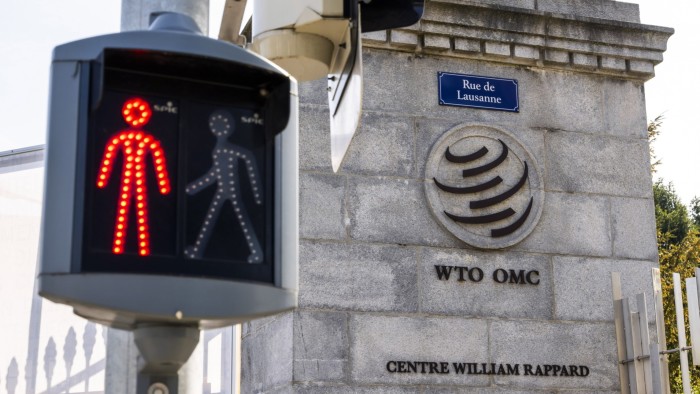Unlock the Editor’s Digest for free
Roula Khalaf, Editor of the FT, selects her favourite stories in this weekly newsletter.
The writer is a senior fellow at the Centre for International Governance Innovation, former executive director at the IMF and former counsellor at the World Trade Organization
“Liberation day”, as US President Donald Trump triumphantly branded his tariff announcement last week, could deal a fatal blow to the already faltering international trading system governed by the World Trade Organization.
Built on two fundamental principles — “national treatment” and “most favoured nation” (MFN) — the WTO was designed to provide predictability to trade and therefore, investment. National treatment guarantees that once imports clear customs, they receive the same treatment as domestically produced “like products”. The MFN rule, with exceptions for free trade zones, requires WTO members to extend equal trading terms to all others.
Trump’s move threatens to unravel this already diminished and outdated framework, turning a rules-based system into a chaotic web of bilateral deals. Yet amid the chaos lies an opportunity: the chance to finally push through long-overdue reforms that could modernise and revitalise global trade governance.
The famous saying attributed to Winston Churchill comes to mind: “Never let a good crisis go to waste.” In that spirit, we should seize the moment and try to rebuild confidence by rethinking some of the WTO’s outdated working practices — starting with its hitherto sacrosanct consensus rule.
While the WTO could take decisions by voting, the practice is to arrive at them by consensus instead. However, trade negotiators tend to see in the proposals of others a chance to extract concessions and advance their own interests. Their instinct is to oppose initiatives in order to gain bargaining leverage.
Beyond this perverse logic, the practice of requiring consensus for all decisions, particularly for new trade negotiations, is paralysing progress at the WTO, for two key reasons.
First, it rests on a legal assumption — that all WTO members are equal in rights and obligations — which does not reflect their vastly different levels of participation in global trade. Second, rising geopolitical tensions make reaching consensus increasingly difficult, turning it into an obstacle rather than a tool for co-operation.
If we are serious about revitalising the WTO, we must have the courage to reimagine the consensus rule in accordance with the realities of world trade. One possibility would be establishing a double majority rule, with decisions requiring the approval of at least 65 per cent of voting members representing 75 per cent of world trade.
If we did move in that direction it would be fair also to strengthen so-called special and differential treatment, which is meant to give special rights to developing countries.
Launching reforms is difficult when confidence among WTO members is at such a low ebb. However, we could start to rebuild trust by identifying avenues for change.
Another option is establishing an independent evaluation office at the WTO — a standard feature of the Bretton Woods institutions and all regional development banks. While this would not guarantee the safe passage of reforms, it would at least ensure that critical problems were not ignored.
The idea is not new, and cost should not be a major barrier. At the IMF, for example, the independent evaluation office operates on just 0.5 per cent of the fund’s operational budget, yet it is highly effective. If the WTO wants to stay relevant and responsive, it is time it considered a similar approach.
The path forward does not have to be one of escalating retaliation and chaos. Cool-headed policymakers should counter Trump’s “liberation” announcement by reaffirming trade co-operation over confrontation. Launching a process to reform and modernise the WTO would reassure markets that stability, not turmoil, lies ahead.


